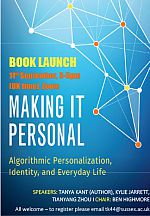Virtual Events
Zoom launch of Dr Tanya Kant's book, Making it Personal: Algorithmic Personalization, Identity and Everyday Life published earlier this year by Oxford University Press.

The event will be a low-key BYOB affair on Zoom featuring Tanya discussing a passage from the book, brief contributions from Kylie Jarrett (Maynooth University) and Tianyang Zhou (University of Hertfordshire), a conversation between the three chaired by Ben Highmore (University of Sussex) and some drinks and questions from the audience afterwards.
A 30% discount code will be available for those who attend and would like to buy the book.
All welcome! If you would like to join, please email Tanya who will add you to the guest list.
You are warmly invited to attend the Zoom launch of Dr Tanya Kant's book, Making it Personal: Algorithmic Personalization, Identity and Everyday Life published earlier this year by Oxford University Press.
Here's the back-cover blurb for those who'd like to know more.
Targeted advertisements, tailored information feeds, and recommended content are now common and somewhat inescapable components of our everyday lives. With the help of searches, browsing history, purchases, likes, and other digital interactions, technological experiences are now routinely "personalized." Companies with access to this information often downplay the fact that users' personal data serves as a key form of monetization, and their privacy policies tend to use the terms "personalization" and "customization" to legitimize the practice of tracking and algorithmically anticipating users' daily movements. In Making it Personal, Tanya Kant sheds light on the dilemmas of algorithmic personalization, exploring such key contemporary questions as: What do users really know about the algorithms that guide their online experiences and social media presence? And if personalization practices seek to act on our behalf, then how can users constitute, retain, or relinquish their autonomy and sense of self?
At the heart of the book are new interviews and focus groups with web users who-through a myriad of resistant, tactical, resigned or trusting engagements-encounter algorithmic personalization as part of their lived experience on the web. Tanya Kant proposes that for those who encounter it, algorithmic personalization creates epistemic uncertainties that can emerge as trust or anxiety, produces an ongoing struggle for autonomy between user and system, and even has the power to intervene in identity constitution. In doing so, algorithmic personalization does not just generate "filter bubbles" for individuals' worldviews, but also creates new implications for knowledge production, the deployment of cultural capital as an algorithmic tactic, and, above all, formations of identity itself.